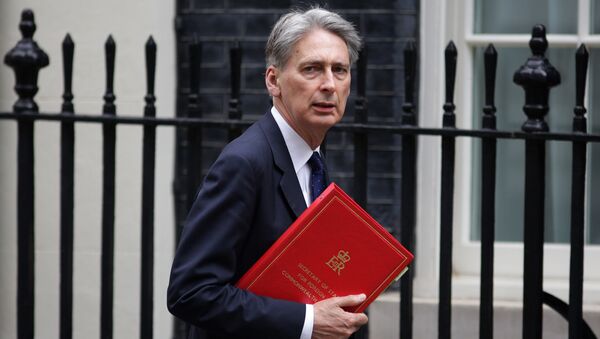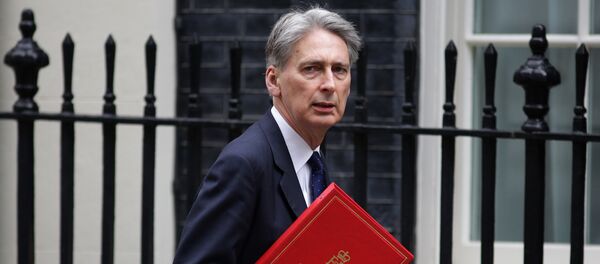Kristian Rouz – In his long-anticipated Autumn Statement, the UK’s Chancellor of the Exchequer (finance minister) Philip Hammond has announced the fiscal stimulus to be more modest than had been expected previously due to the weaker impact of the Brexit vote to the economy.
The likely outcomes of the stimulus might result in quicker growth after a projected slowdown in 2017, decline in bond value and higher yields, driving investment in real economy rather than haven assets, and an increased pressure on the budget, which might require additional sources of income.
UK Chancellor Hammond admitted the uncertainly in the markets and real economy entailing the Brexit vote on 23 June has resulted in a projected slowdown in GDP growth to 1.7pc in 2017 from the current 2.3pc. A “black hole” in governmental finances, another Brexit consequence, would require an increase in borrowing by £122 bln over the next six years, Hammond said. However, the announced stimulus package had been thought to be greater in scale, rendering investors fairly optimistic of the economic future of the post-Brexit Albion.
Speaking before the Parliament on Wednesday, the Chancellor outlined the numerous challenges to the UK’s economy over the medium-term, stemming from the risks associated with Brexit, and global uncertainly.
"That's slower, of course, than we would wish,” Hammond said, referring to the projected pace of GDP growth in 2017 adding that economic expansion in the UK would be “still equivalent to the IMF's forecast for Germany, and higher than the forecast for growth in many of our European neighbours, including France and Italy."
Employment in the UK, Hammond stressed, is at its all-time highest, providing additional sources for optimism in the economic outlook. Five months into the Brexit reality, the British economy has not slowed down, allowing the Exchequer to stay on its path to gradually reduce public sector borrowing, albeit slower than planned previously.
Governmental borrowing will fall from 4pc of the GDP in 2015 to 3.5pc this year, and to 0.7pc in 2020-2021, Hammond said. However, borrowing will increase in the short-term, to £68.2 bln this year and £59 bln in 2017 (compared to £59 bln, and £38.8 bln projected previously), in order to finance public expenditures, mainly on infrastructure projects, allowing to boost broader growth in the medium-term.
Meanwhile, independent watchdog the Office for Budget Responsibility (OBR) revised downward their outlook on the UK’s growth from 2.2pc to 1.4pc for 2017, citing higher inflation as main downside factor. Inflation is gaining momentum in the UK beyond the Bank of England’s (BoE) 2-percent target, which will likely require measures of monetary tightening, including raising base borrowing costs from the current 0.25pc, and thus hampering economic expansion.
The Labour Party quickly responded to Hammond’s Autumn Statement, dubbing it a “failure.” Shadow Chancellor John McDonnel blasted the government’s fiscal policies as the “abject failure of last six years.” Left-leaning Labour are dissatisfied with the cuts to budget spending, which are deemed necessary to the ruling Tories in order to finance the stimulus package.
"This statement … offers no hope for the future,” McDonnel said. “This is a new Conservative leadership with no answers to this country following Brexit and no plan to ensure our future prosperity.”
The Labour insist on retaining a tariff-free trade with the European Union, whilst the ruling Tories see slapping bilateral trade with customs taxes as a likely possibility in order to reinvest these funds in domestic economy.
Scotland is also opposed to Downing’s Street austerity policies, and, despite receiving an additional £800 mln from the budget as provided by Hammond’s Autumn Statement, has called for even greater spending.
“Austerity has not closed the deficit … but it has inflicted severe economic pain and caused misery in communities across Scotland and the UK,” Kezia Dugdale, leader of Scottish Labour, wrote to Chancellor Hammond. “Austerity has proven to be both unfair and ineffective and with Brexit casting a long shadow over the economy, it cannot continue. I believe it should be immediately abandoned in favour of a new strategy predicated on sustained investment in our infrastructure, economy and public services.”
The Tory cabinet, meanwhile, is adamant to strike a balance between their commitment to austerity and an appropriate stimulus allowing to erase the possible negative consequences of Brexit.
With the UK’s borrowing increasing by £122 bln over the next five years, the bond market dynamics suggest greater private capital allocation in real economy due to the gilts’ drop in value. Subsequently, the fiscal stimulus plan has solid chances to succeed, albeit thorough adjustment and coordination with the BoE’s monetary policies might be required further down the road.







